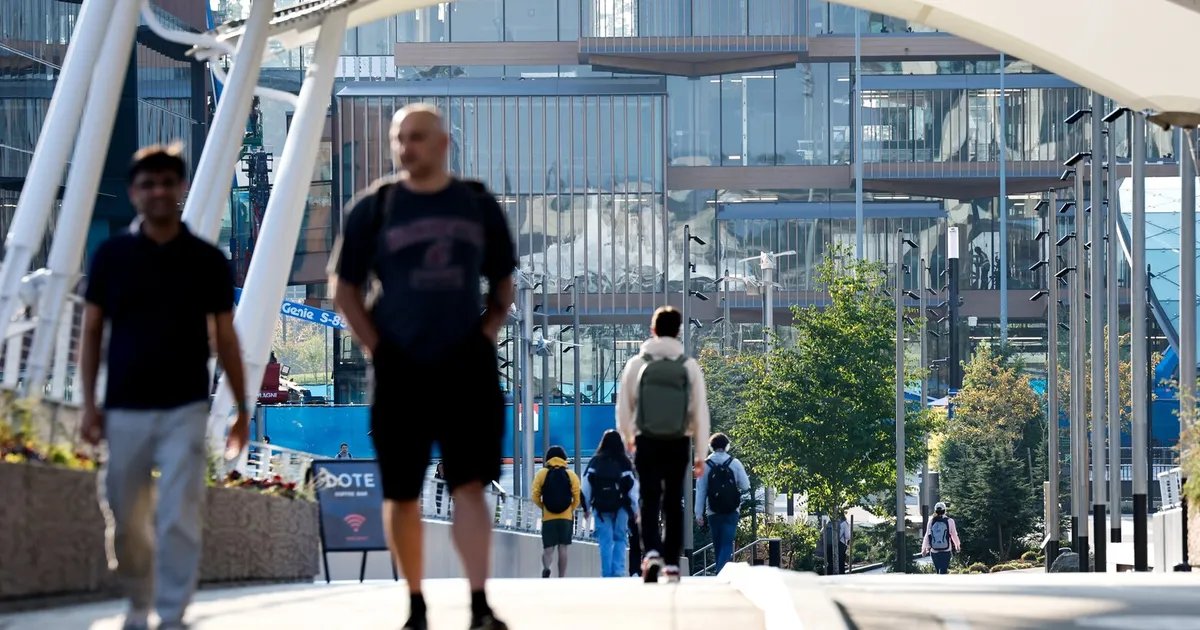Rhonda Gilligan didn’t want to retire.
Over decades, she built a formidable reputation in the tech industry bringing well-known brands online. Gilligan served in senior roles at big companies like IBM, Expedia and Microsoft. She worked at Disney, where she presented projects directly to Bob Iger, and at Amazon, where she presented to Jeff Bezos.
“I have a damn good résumé,” she said in an August interview from her home in Redmond.
In April 2024, Gilligan was laid off from her job as design director at GoodRx, a telemedicine company. Suddenly, at 65, she found herself facing the most competitive job market of her life.
Just a few years ago, tech sector workers like Gilligan were getting emails from recruiters hawking new openings nearly every day. Now, people who still have their jobs are hanging tight as Amazon, Microsoft and other tech giants cut payroll, while unemployed workers face a daunting new reality: a lot fewer opportunities and a lot more competition.
Pandemic job gains wiped out
In the Seattle area, tech industry employment began to plummet in late 2022, a dramatic reversal for a fast-growing field.
From the start of 2020 through mid-2022, employment in the information sector — a broad category commonly used as a proxy for the tech industry — jumped by 13.9% in Seattle and Bellevue, according to data from the state Employment Security Department.
By comparison, total private sector employment increased by merely 0.3% in the same period. In other words, while the Seattle area was just recovering to prepandemic employment levels, tech had already made enormous gains.
That would soon change.
In the summer of 2022, local tech employment began to slip, falling almost every month through the end of 2023. Employment levels held steady in 2024 before dipping again in 2025. The tech jobs gained in Seattle and Bellevue over the early years of the pandemic have been wiped out.
“We’re in a moment where a lot of the tech jobs are dropping off,” said Anneliese Vance-Sherman, the state’s chief labor economist. “We’re seeing layoffs. We’re seeing slowing down of hiring.”
Despite the recent decline in jobs, the tech sector remains a major source of employment in Washington, Vance-Sherman emphasized. But for workers in an industry where jobs always seemed plentiful, it can be jarring when hiring cools.
“This is an industry, and a group of professionals, that have experienced high growth ever since it really rooted,” she said. “We’re at a point where … you can’t take for granted that there’s always that additional job opening.”
The tech industry attributes recent trends to a number of factors. Employers hired too much and too quickly during the pandemic, and many workers say recent layoffs are attempts to bring employment back to sustainable levels.
New technology is also a driver. This year, both Redmond-based Microsoft and Seattle-based Amazon cut jobs in Washington amid efforts to free up resources to invest in costly artificial intelligence developments.
Overall, people are feeling “far less optimistic,” said Laura Close, a career coach whose clients are primarily tech workers. A decade ago, Close’s clients could land a job in five months; today, it takes closer to a year.
From the perspective of job seekers, every layoff floods the picked-over market with more competition.
“It’s just these musical chairs, and there’s not enough chairs for all the people,” said Eli Goldberg, who was laid off from Indeed, a job listing website, in May 2023.
Since then, most of the offers Goldberg has received were for contract positions, which paid by the hour and didn’t come with health insurance, retirement benefits or paid time off. Today, he lives off income from a rental property.
“I’ve just been kind of working under the assumption that I don’t think a job is going to happen,” Goldberg said.
Job search has become a numbers game
Even workers who eventually find jobs describe feeling like they faced staggering odds to land them.
A software engineer in the Seattle area named James, 48, spent more than two years looking for work before getting his current position. He applied to more than a thousand jobs, and got only a dozen interviews. (He requested that his last name be withheld because he is still applying to new roles.)
Just a few years ago, a typical job search would simply be a matter of making his LinkedIn profile public. “You would be bugged by recruiters all the time,” he recalled. “I’d have half a dozen messages a day, and maybe two or three were interesting.”
While he was unemployed, James and his family lived off unemployment and then savings, while relying on social safety net programs including Medicaid, food stamps and food banks.
Eventually, he was offered a tech job; the compensation represented a 25% pay cut compared with his previous role. He took it, accepting that he would probably never return to his previous economic trajectory. “I would still be unemployed if I hadn’t taken a job.”
Prolonged unemployment can have negative economic ramifications on workers that last long into their lives.
“If you’re out of work for a year, now, you’re eating into your retirement; you’re borrowing off your retirement to live,” said Timothy Thomas, a career coach based in Seattle who works with tech sector employees.
Workers can typically get around six months of unemployment benefits, which Thomas said isn’t long enough to cover a usual tech job search these days.
In the Seattle area, more people are competing for fewer jobs, according to state employment data. Online job postings for computer and math occupations in King County have fallen by half since summer 2022. Meanwhile, the number of people looking for tech jobs has more than quadrupled, according to unemployment claims data.
Tougher odds — combined with the frictionless ease of the online job applications — have turned the search into an unforgiving numbers game.
One of Thomas’ clients is a small tech company that recently posted a software developer job on LinkedIn. It got hosed with 2,400 applicants within three days.
Chances are, just a sliver of those applicants are actual humans.
Increasingly, job seekers are turning to artificial intelligence-based software to apply for jobs on their behalf, Thomas said. These tools, commonly referred to as “agents,” scour the web for job listings, flagging those with keywords and automatically applying.
James, the software engineer, didn’t use an agent in his job search but knows that his peers in the industry might be.
When everyone else is taking a spray-and-pray approach, the pressure increases to do the same, he said. “You apply to just a gazillion jobs.”
If you’re lucky, you’ll end up with one of them.
College students face a daunting future
Even workers at the foot of the career ladder are feeling the heat.
The search for a college internship — a coveted, often well-paid steppingstone into the field of computer science — has become a race, too. Akshaya Akkugari, a sophomore at the University of Washington, began her search for a summer 2026 position more than a year in advance.
“Applying for more is better than applying for too little,” she said. Akkugari estimates that she spent between two and three hours each day scouring LinkedIn and GitHub for positions.
The mood among computer science students has quickly turned gloomy. For the 2025 graduating class, more than a quarter of computer science graduates reported feeling pessimistic about the job market — a 10-percentage-point jump from just a year prior, according to a sentiment survey conducted among 2,800 graduates by Handshake, a popular job application platform for students.
Part of the negative outlook is a reflection of an evolving labor market, one in which the youngest and least experienced workers have less leverage than ever.
The number of people earning a bachelor’s degree in computer and information sciences has almost doubled over the past decade. Meanwhile, new grad hiring has plummeted 50% below prepandemic levels, according to one recent analysis of the tech job market.
Then there’s the existential threat posed by artificial intelligence. In just the past three years, employment has substantially plummeted for early career workers in occupations most exposed to the technology, such as software developers, according to a recent analysis of payroll data conducted by economists at Stanford University. Early research about occupational disruption due to AI has found that knowledge-intensive work — including software development and writing — is particularly at risk.
Some local college hopefuls appear to be turning away from computer science, at least for the moment. At UW — long known for minting new tech workers — interest in computer science fell among freshman applicants in 2025 after over a decade of steep and relentless climbing.
Given its reputation, UW graduates are still in high demand: Even as hiring is down across the industry, job placement among the graduating class of 2025 reached an all-time high, according to a survey of former students.
Vaishnavi Vidyasagar, 21, recalled the optimism that computer science grads once had about their prospects. When she was a high schooler in Sammamish a few years ago, she’d hear stories about UW alumni getting jobs at Amazon and Microsoft straight after graduation.
Now a senior at UW, she and her peers approach the job search with more trepidation.
“It’s not something that’s given, it’s more something you’re really having to earn,” she said. “Opportunities have become more precious.”
Industry veterans like Gilligan see a turning point for the industry.
Gilligan was eager to stay in the workforce when she was laid off by GoodRx last year. She has a 23-year-old daughter, who depended on her for health insurance at the time. Gilligan also wanted to wait until she was 70 before she began collecting Social Security, to maximize her benefits.
Most of all, she simply didn’t feel “done” with her career.
But after months of rejection, she retired reluctantly five years ahead of schedule.
“It was never what I wanted,” she said. “It was what I was pushed into.”
Cast out of tech, Gilligan now works as a volunteer for Whole Washington, a nonprofit that advocates for universal health care in the state.
“There is something about getting kicked out of your career that does open your eyes to new opportunities.”
She expects current job market trends to hold, and for pay in the industry to fall. There will always be jobs in tech, but the work will be different.
“This kind of golden age of tech — where we were pampered and spoiled and we had three meals a day and all the snacks we could eat, fat salaries and big bonuses — that’s done,” Gilligan said.
“Working in tech will go back to being just a job.”
Microsoft Philanthropies underwrites some Seattle Times journalism projects. The Times maintains editorial control over all its coverage.








1 Comment